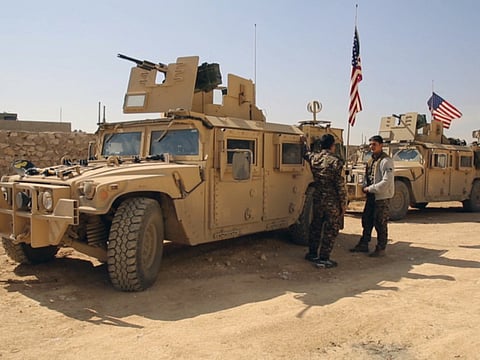At Turkey’s expense, US teams up with Russia in Syria
As outside powers step up the fight to crush Daesh, the battle is laying bare their often-conflicting loyalties

Ankara: The US and Russia have found themselves teaming up for the first time in the war in Syria — against a country both call an ally: Turkey.
In Manbij, a town in northern Syria about 40 kilometres from the Turkish border, US and Russia moved this week to effectively block a drive by Turkey to seize it.
A US deployment and a Russian-brokered deal with Syrian forces created buffer zones that headed off any Turkish drive against the Kurdish forces — seen by Washington as key allies against Daesh, though Turkey views them as terrorists — who now hold the town.
As the outside powers fighting in Syria step up the fight to crush Daesh, the battle is laying bare their often-conflicting loyalties. With all sides pushing into terrorist-held territory, the potential for clashes between the players is rising.
Russian President Vladimir Putin is at the centre of this thanks to his military campaign, but he must keep allies like Syria and Iran on his side even as he tries to cooperate with the US and Turkey. Turkish President Recep Tayyip Erdogan is visiting Moscow on Thursday with his defence minister for talks with Putin.
“This is a unique circumstance when the US and Russia have found themselves thrown together against Turkey because of the Kurds, who are directly sponsored by Washington and get Russian support too,” said Alexander Shumilin, head of the Middle East Conflict Center at the Institute for US and Canada Studies, a government-run research group in Moscow.
Turkish Prime Minister Binali Yildirim said his country was seeking a “trilateral mechanism” to clear the area of “terrorist groups.”
In Manbij, “the US is raising a flag, Russia is raising a flag nearby, things have turned into a flag competition,” Yildirim said in an interview with ATV television.
Later on Tuesday, Yildirim said countries operating in Syria must coordinate their actions to eliminate all terrorist groups.
“Turkey told its counterparts that no terror group can be destroyed by using another terror group,” he said in Ankara. “If coordination can’t be established, then there could be a risk of confrontation, which we do not wish for.”
The standoff has emerged as Russia has taken the diplomatic lead in seeking to resolve the war in Syria after its air campaign that started in 2015 succeeded in bolstering President Bashar Al Assad.
Under pressure in Washington over allegations of Russian interference in the US election, US President Donald Trump has backed off his campaign pledge to cooperate on fighting terrorism in Syria with Putin. Still, last month US warplanes helped indirectly in the Russian-backed Syrian offensive to recapture the historic city of Palmyra, carrying out 23 strikes over nine days, as much as during the rest of February. Now, faced with Turkey, the two powers appear to have taken a tactical joint stance.
In a bid to lower the tensions, US joint chiefs of staff chairman Joseph Dunford, Russian chief of the general staff Valery Gerasimov and Turkey’s chief of the general staff Hulusi Akar met in the southern Turkish city of Antalya on Tuesday.
“It is a measure of the success that forces are having in countering the Islamic State [Daesh] of Iraq and Syria that the conversation is necessary,” the US defence department said in a statement. It noted that areas like Manbij have become “a crowded battlespace” and the proximity of the various forces had created “a dangerous situation.”
Turkey sent troops across the border into Syria in August, backing Free Syrian Army rebels in battles against Daesh. The army has also clashed with Kurdish groups that the government in Ankara regards as terrorist organisations with links to separatists in Turkey, and which took control of Manbij after expelling Daesh from the town just before the Turkish incursion.
Turkey has sought the support of the US, its Nato ally, to lead a ground offensive against Daesh’s main Syrian stronghold of Raqqa that would advance through areas controlled by Kurdish fighters, a Turkish official said last week. But the US views the Kurds as an essential element of the battle against the group that has waged a global campaign of terrorist attacks from its so-called caliphate in Syria and Iraq.
Full-scale hostilities between the Turks and Kurds would pose a major setback for efforts to capture Raqqa, according to Joshua Landis, head of the Centre for Middle East Studies at the University of Oklahoma. “It’s important to get a buffer between the Turks and Kurds so Isis [Daesh] can be beaten,” he said.
The US has moved 500 soldiers to the outskirts of Manbij, according to Ilnur Cevik, chief adviser to Erdogan. The US-led coalition “has taken this deliberate action to reassure coalition members and partner forces, deter aggression and keep the focus on defeating Isis [Daesh],” spokesperson Col. John Dorrian said on Twitter.
The US and Russian moves leave Turkey with “no more room to manoeuvre,” said Faysal Itani, an analyst with the Atlantic Council in Washington. That will enable a Kurdish-led operation to capture Raqqa and the Syrian government to deploy its forces too in the area, he said.
Sign up for the Daily Briefing
Get the latest news and updates straight to your inbox



